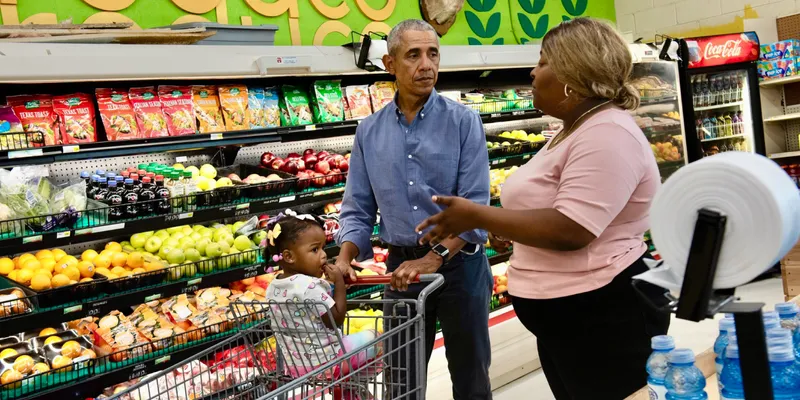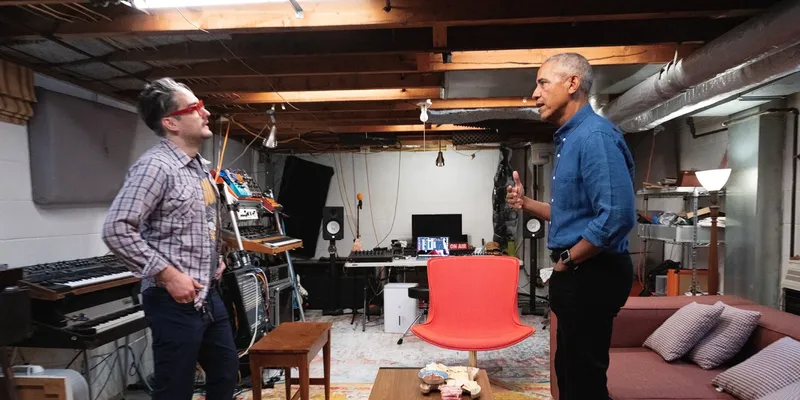Barack Obama's docu-series Working shies away from hard questions
While former US President Barack Obama brings honesty and poignancy to his interviews with employees and people across income groups, this docu-series doesn’t ask CEOs tough questions on growing income and employment inequality.
Rating: 4/5
Starring: Barack Obama
Former US President Barack Obama’s docu-series ‘Working: What We Do All Day’ gives away a lot about its contents in the title. While this documentary is timely and relevant, and also educative about a potential workforce displacement worldwide, it keeps safe territory on much-discussed topics of income inequality.
Co-produced by Barack and Michella Obama, this Netflix docu-series takes off from the former President’s college day impact of author and broadcaster Studs Terkel’s book, Working: People Talking About What They Do All Day and How They Feel About What They Do’. He updates the project to present times as the doom-inducing AI revolution looms large over workplaces across industries.
While most of the interviews with employees across income levels are engaging and heartfelt, the final episode, titled ‘The Boss’, where CEOs get interviewed, lacks sharpness. The bosses are surprisingly affable and welcoming. But their wealth, privilege, and power is not really questioned. Underlining their sharp contrasting spheres of work and income, this episode features Natarajan Chandrasekaran, Chairman, Tata Sons, alongside Chris Urmson, Co-founder and CEO, Aurora, and Jeanette Felton, CEO at Home Care Mississippi.

Obama with Randi, a home care aide, in docu-series 'Working: What We Do All Day' (Image: Twitter)
Through four episodes, the show looks at work-life from basic jobs to ‘dream jobs’ in three key industries that could get impacted with inclusion of robotics and AI--driving, hospitality, and home care.
The first episode deals with three women who work for daily wage or less than daily wage, and the interviews present a sad and poignant portrait of their lives. Managing children as single moms, delivering food, or working as home care nurses, each one tackles a demanding job while getting paid very little. Dealing with social and economic prejudices, each one soldiers on, optimistic and realistic in parts.
Hospitality is filmed at the Pierre Hotel, New York, A Taj Group property, with active focus on employees and their enthusiastic interactions with guests to keep this hotel bustling and well-managed. The housekeeper in this episode, Elba, represents the typical immigrant success tale of the USA. She sees survival as success.
President Obama, with the sheer ease that he carries each interview, makes these conversations heart-warming. He touches a chord when he highlights the plight of those at the bottom of the labour force in the USA. This leads to the second episode, about those jobs that pay the bills, but aren’t anyone’s passion.
Through personal interviews, Obama brings effortless charm to each episode, as comfortably jamming with a music composer in his basement music room, as he is talking to team managers of underpaid and overworked day care nurses. If anything, he is the star of this series. He traces socio-economic shifts within USA since the fifties to present day. The thrust of his argument is that in a world where workplaces are structured on a rapidly growing class divide, the middle class is dying out. And this is not a good thing for anyone- the rich or the poor; the corporation or the corner store.
While the third episode tackles privileged professionals who work knowledge jobs, aptly titled ‘Dream Jobs’ because they are affluent, it feels disconnected from ground reality. For instance, Karthik, a top tier robotics engineer of Indian origin, is part of the next level driverless driving corporation, Aurora. He is key to building and testing a road ready driverless car. Karthik comes from a country where nearly a 100 million jobs need to be added every year. That his response to summarily creating a tool to wipe out a form of employment is not featured, indicates the soft touch of this documentary.

Obama in conversation with Luke, a data manager for a self-driving vehicle company Aurora Innovation. (Image: Twitter)
For those that are familiar with Obama’s literary influences and books, one recognises continued thoughts of the former President. With references to Milton Friedman shaping profits over public good as the ethos of any company, Obama takes centre stage both as the main interviewer and the narrator. Yet, it is hard to miss the inclusion and adaptive nature of this series--with credible names like Davis Guggenheim and Laurene Powell Jobs among the long list of producers--accommodation for those that are eye wateringly rich is not surprising.
It is the final episode that rankles. When Urmson is questioned about the potential removal of drivers from the workforce, he refers to the lessening of carriage makers in the past. But given the population boom and growing unemployment worldwide, his PR structured response almost feels irresponsible. When the spotlight turns to Natarajan Chandrasekaran, called Chandra by most, his concern about blending philanthropy with technology at least feels grounded. As to how this would happen, the docu-series doesn’t get around to explore details.
Working wins on one front; it emphasises the value of hard labour through the stories of people featured in it. Kenny, a lobbyist in Washington from Mississippi, justifies his reasons for public service. Jeanette, who takes a CEO salary well below six figures and pays her employees before herself, personifies the hard-working community service businesswoman. Hers feels like a lost cause in the rapid vault into technology.
Hard work serves employees across all four episodes, including Chandra’s origin story from rural India. But the grim reality of large-scale global workplace displacement and catastrophic socio-economic fallout of this is mostly left unaddressed.
Edited by Megha Reddy







